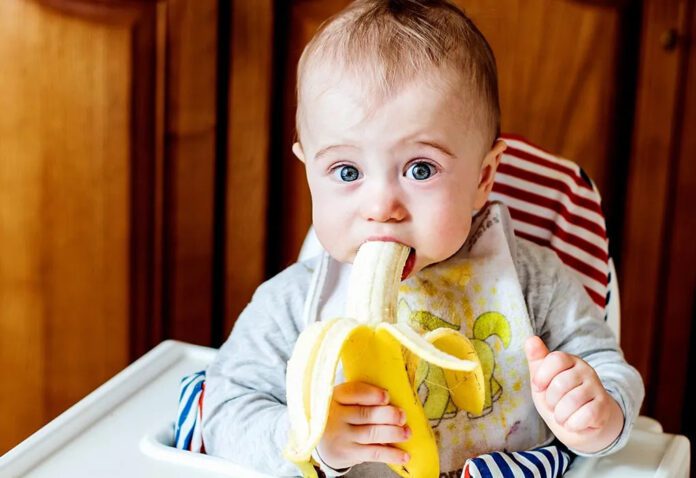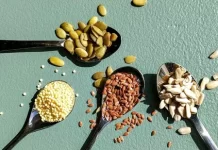Can Bananas Cause Eczema In Babies? Yes, bananas can potentially trigger eczema in babies due to their allergenic properties. Bananas, a popular and nutritious fruit, have the potential to trigger eczema in babies.
Patches of skin that are itchy and irritated are typical symptoms of eczema. Although food allergies can be one of the many factors for eczema, certain people have been known to experience allergic reactions to bananas in particular. These reactions can cause discomfort and irritation in babies by resurfacing eczema.
It is crucial for parents to watch out for any changes in their baby’s skin when they eat certain foods, such as bananas, as they could be allergens.
If you think your baby’s eczema is being caused by a banana allergy, get advice and a proper diagnosis from a medical specialist.
Understanding Baby Eczema
Many babies suffer from the common skin ailment known as baby eczema. In order to provide the right care, it is essential to comprehend the signs of baby eczema.
The skin is irritated, dry, and itchy in this condition. Eczema in babies is characterized by red patches, rashes, and occasionally even weeping or crusting.
Even though this illness is common, pinpointing the triggers can be difficult because each infant is different.
Baby eczema is frequently brought on by a number of irritants, including allergies, rough textiles, and perfumes. Weather-related factors, such as high humidity and temperatures, can potentially make symptoms worse.
Furthermore, some babies have been reported to develop eczema as a result of food allergies. It is important to remember, though, that not every baby who eats certain foods—like bananas—will get eczema.
| Importance of Identifying Triggers |
| The identification of triggers is crucial in managing and preventing baby eczema flare-ups. |
| By pinpointing specific triggers, parents can make necessary lifestyle adjustments for their little ones. |
| Keeping a diary to track symptoms along with potential triggers can help identify patterns. |
| Consulting with a healthcare professional can provide further guidance on managing baby eczema. |
The Link Between Bananas And Baby Eczema
Parents frequently worry about food allergies and sensitivities, particularly when it comes to the health of their infant.
Whether or whether bananas can cause eczema in babies is one particular allegation that has drawn attention. There is currently little research on this subject, and there is no hard proof that bananas cause eczema flare-ups in babies.
Although some babies may experience an allergic reaction to bananas, this does not always result in eczema. It’s crucial to remember that eczema is a complicated ailment with a variety of causes that are not just tied to eating bananas.
It is best to speak with a physician or allergist if you think your child may have food allergies or sensitivities so they can receive an accurate diagnosis and advice on how to manage their diet.
Factors To Consider
When it comes to baby eczema, factors to take into account include individual differences and allergies. Every baby’s eczema trigger is unique, so it’s critical to pinpoint and treat the underlying causes.
Certain foods, like bananas, may cause allergies in babies, which may make their eczema symptoms worse.
Other environmental elements like pollen or pet dander, as well as chemicals found in soaps and detergents, should be considered as potential causes for newborn eczema.
It is essential to seek medical advice for treating and managing infantile eczema. They can offer advice on locating triggers, providing appropriate skincare products, and, if required, proposing dietary changes. It is best to consult a specialist to safeguard your baby’s comfort and well-being.
Managing Baby Eczema
When it comes to baby eczema management, avoidance techniques for possible triggers should be taken into account.
When it comes to your baby’s eczema-prone skin, avoiding typical irritants like harsh cleansers and sensitive materials will help prevent flare-ups.
Choosing soft cotton garments and soothing, fragrance-free products can be advantageous. Developing a good skincare regimen is also essential for controlling eczema in infants.
Emollient creams applied on a regular basis can help moisturize your baby’s skin and reduce itching. For medical treatment options, speaking with a pediatric dermatologist is equally vital.
When symptoms flare up, they could suggest using prescription creams or topical corticosteroids to relieve the pain.
To determine the best strategy for managing your baby’s eczema, consult with your healthcare provider regularly.
Keep in mind that every baby’s eczema is different, and what works for one baby may not work for another.
Frequently Asked Questions Of Can Bananas Cause Eczema In Babies?
What Foods Trigger Baby Eczema?
Common trigger foods for baby eczema include cow’s milk, eggs, peanuts, soy, wheat, and fish. [Can Bananas Cause Eczema In Babies?]
How Do I Know If My Baby Is Allergic To Bananas?
Your baby may be allergic to bananas if they experience symptoms like rashes, itching, or difficulty breathing after consuming them. Keep an eye out for indications of an allergic response and seek medical advice to be sure.
Does Banana Cause Eczema?
Eczema is not directly brought on by bananas. On the other hand, some eczema sufferers might be allergic to or sensitive to specific foods, including bananas. Identifying triggers for specific cases can be aided by speaking with a physician or allergist.
What Are The Side Effects Of Bananas For Babies?
Babies usually don’t experience any serious adverse effects from bananas. Bananas can, however, in rare instances result in allergic responses or constipation. It is crucial to gradually introduce bananas and monitor for any negative reactions. See your pediatrician if there are any issues you observe.
Conclusion
In conclusion, more research is required to definitively demonstrate a connection between bananas and eczema in babies, even though there may be one.
It’s crucial for parents to watch how their child responds to various foods and to get medical advice from a pediatrician if they think there may be negative consequences.
In the end, every infant is different, so what suits one might not suit another. Put your child’s welfare first, follow your gut, and pay attention to any potential triggers.










